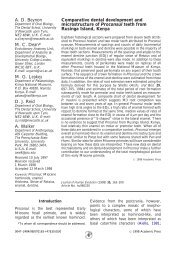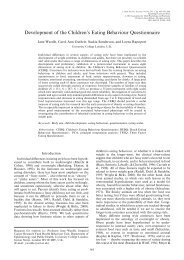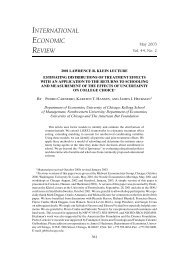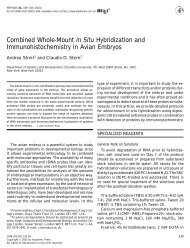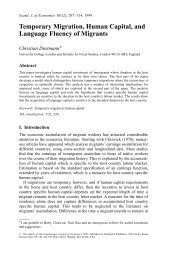The Ambitions of Contract as Promise Thirty Years On ... - UCL
The Ambitions of Contract as Promise Thirty Years On ... - UCL
The Ambitions of Contract as Promise Thirty Years On ... - UCL
Create successful ePaper yourself
Turn your PDF publications into a flip-book with our unique Google optimized e-Paper software.
<strong>Ambitions</strong> <strong>of</strong> <strong>Contract</strong> As <strong>Promise</strong> 24 August 2012 discussion draft: do not quote or reproduce without permission<br />
rational actors seek to maximize their long-term advantage and will prefer legal<br />
arrangements that facilitate its attainment. In respect to contract, its institutions<br />
may be analyzed either <strong>as</strong> serving this disposition <strong>of</strong> the contracting parties or,<br />
if they do not, <strong>as</strong> serving the interests <strong>of</strong> some other cl<strong>as</strong>s <strong>of</strong> actors orbeing<br />
irrational. 16 <strong>The</strong> normative law-and-economics account starts with a premise<br />
quite dissimilar to that embraced by <strong>Contract</strong> <strong>as</strong> <strong>Promise</strong>: the law should be<br />
designed to allow people in a voluntary relationship to structure that<br />
relationship in the way that they judge will best serve their interests over the<br />
long run. 17 Respect for the autonomy <strong>of</strong> individuals requires that they be treated<br />
<strong>as</strong> the best judges <strong>of</strong> their own interests. This premise builds on several<br />
background premises that also accord with <strong>Contract</strong> <strong>as</strong> <strong>Promise</strong>: for instance,<br />
that the arrangement does not impose on third parties costs that those third<br />
parties have any moral right to complain about 18 ; that the contracting individuals<br />
16 For a concise and incisive statement <strong>of</strong> the economic point <strong>of</strong> view and a sharp critique <strong>of</strong> <strong>Contract</strong><br />
<strong>as</strong> <strong>Promise</strong>, see Richard Cr<strong>as</strong>well, <strong>Contract</strong> Law, Default Rules, and the Philosophy <strong>of</strong> Promising, 88<br />
MICH. L. REV. 489 (1989) [hereinafter Cr<strong>as</strong>well, Default Rules].<br />
17 Pr<strong>of</strong>essor Cr<strong>as</strong>well argues, for example, that the point <strong>of</strong> law generally is enhancing social welfare, not by<br />
moral force but by facilitating investment in, and exchange <strong>of</strong>, better products and services; and contract law<br />
improves the quality <strong>of</strong> contract <strong>as</strong> a “product” in this sense. Richard Cr<strong>as</strong>well, <strong>Promise</strong>s and Prices, 45<br />
SUFFOLK U. L. REV. 735, 738–39, 776 (2012). Daniel Markovits and Alan Schwartz justify expectation<br />
damages <strong>as</strong> the most likely to encourage the maximization <strong>of</strong> economic surplus, while George Triantis and Juliet<br />
Kostritsky question whether the expectation damage remedy truly reflects the choice <strong>of</strong> many contracting parties.<br />
See Daniel Markovits & Alan Schwartz, <strong>The</strong> Expectation Remedy and the Promissory B<strong>as</strong>is <strong>of</strong> <strong>Contract</strong>, 45<br />
SUFFOLK U. L. REV. 799 (2012); George Triantis, Promissory Autonomy, Imperfect Courts, and the Immorality<br />
<strong>of</strong> the Expectation Default Remedy, 45 SUFFOLK U. L. REV. 827 (2012); Juliet P. Kostritsky, <strong>The</strong> <strong>Promise</strong><br />
Principle and <strong>Contract</strong> Interpretation, 45 SUFFOLK U. L. REV. 843 (2012).<br />
18 For instance, if Dick and Jane agree to enter into an intimate relationship, this may cause<br />
10




